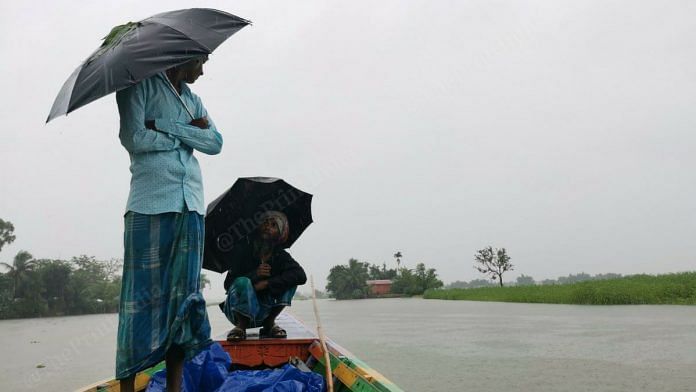New Delhi: With India having reported more than 6.4 lakh Covid-19 cases, of which more than 2 lakh are active, authorities are struggling to contain the spread of the pandemic, even after several phases of lockdown enforced across the country.
Now, even as India’s caseload is increasing, lockdown restrictions have been eased in most parts of the country, notably for interstate travel.
Adding to people’s fears are the political tussles over testing numbers, the lack of public health infrastructure basics such as hospital beds and ventilators, and now a controversy over the ICMR’s (Indian Council of Medical Research) attempts to push out a vaccine in six weeks. Meanwhile, many are still struggling to find work and get enough food, and others are dealing with disasters such as floods.
In all this, ThePrint’s reporters and photojournalists have been travelling across India to bring you accurate eyewitness accounts of how the pandemic continues to unfold in different parts of the country.
This week, we bring you stories from Maharashtra, Assam and Uttar Pradesh.
Filthy shared toilets in Thane, virus spreads in rural UP
Thane, a satellite town of Mumbai, has a population of 18.5 lakh people. As of 1 June, it had recorded 3,271 Covid cases. By 30 June, this number had shot up to 9,644. According to an official of the Thane Municipal Corporation, a major reason for the spread of the virus is the fact of shared toilets.
More than half of Thane’s area consists of slums, where one communal toilet is shared between multiple families who live in extremely cramped quarters. Although officials insist the toilets are cleaned twice a day, when ThePrint’s Ananya Bhardwaj visited Lokmanya Nagar, Mumbra and Wagle, she found a completely different scene. Toilets used by hundreds of people had not been cleaned in a week, said residents, and there was no sanitiser, disinfectant or even soap.
Slum residents also rubbished the municipal authority’s claims of door-to-door screening. Rama Kehar, who lives in Pujari chawl, said the authorities came, took down a few details — “name, where we work and how many members in a room – and left”. Read more here.
Meanwhile, in Uttar Pradesh’s Firozabad district, the return of migrant workers from the cities has meant a sharp spike in Covid cases. Of the more than 10,000 people who returned to the district after the lockdown, around 4,000 returned after May, and the caseload is now double of what it was a month ago, District Magistrate Chandra Vijay Singh told ThePrint’s Revathi Krishnan and Praveen Jain.
And with the easing of movement between cities and states, there is constant movement between Firozabad and Agra, which has better medical facilities. Read more about how rural UP is coping here.
Also read: How many Covid cases in Maharashtra? State govt and civic bodies can’t make up their minds
Dhubri copes with floods and unemployment
Assam now has more than 8,500 Covid cases, but in the Dhubri district, the villagers have other concerns as well.
Around 80 per cent of the 24.9 lakh people who live in the char villages — settlements on deposits of alluvial soil made by water — are below the poverty line. Many of them migrate to cities in Assam and in other parts of the country for work, and meanwhile, their families are forced to keep being on the move as well, as char villages, settlements on alluvial soil deposits, flood easily.
Now, the migrants themselves have returned, with no job in hand, no money coming in, and they still don’t have a permanent home. “I can’t earn anything here. The floods have also come now. Whatever my parents can scrounge, we will have to manage with that,” 19-year-old Ismail Sheikh told ThePrint’s Angana Chakrabarti and Yimkumla Longkumer.
When ThePrint visited Ismail Sheikh’s house, accessible via a 40-minute boat ride, they found the entire family of 15 living in a makeshift tin house, similar to other ones around them. There was one double bed and a single light bulb above. “We had 1 bigha land here, but because of the river it all got eroded. I’ve been here for 12-13 years and if this breaks then we won’t have a place to live,” Ali said, pointing to the water. Read more here.
Also read: Why Himanta Biswa Sarma, not CM Sonowal, is once again Assam’s face amid Covid crisis




U P & Bihar both are a problems for india. It eats up the most tax payers money from Mumbai. The both states illitrate migrantvwirkers make Mumbai, mahrashtra a gutter dye to their habit of oppen diflection, criminal activities sex crime etc.